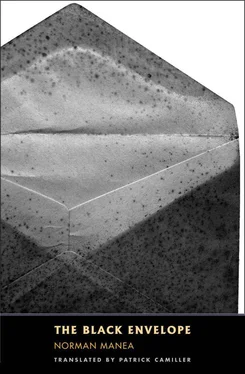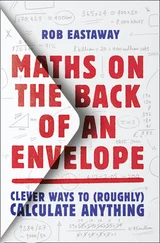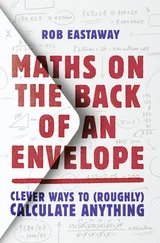“You know, I’m Toma.”
Let him prove his identity, make him. He was holding a maroon-colored rectangular piece of cardboard.
“Come on, that’s me — it’s an old photo.”
How old can the picture be of such a young condottiere? He was already sitting in the armchair opposite, already making his confession: artful, humble, badly paid.
“I hope you weren’t angry. I wanted to get to know you. In fact, you look like an uncle of mine. I haven’t got a father: I grew up in orphanages.”
Throw him out? Or just fall asleep, quite simply, overcome by sloth and disgust, while the professional delivers the aria?
“You know, since I was put in charge of the administration, we no longer pay anyone from outside: we’ve got someone who actually lives here.”
A thin, shy voice, small yellow teeth, narrow, anemic cheeks, with an exaggerated mustache and that inevitable scar.
“I’d like to know about your plans. I wouldn’t take advantage, but I would like us to get together from time to time.”
So, just a pathetic angler for humdrum loot. So was he, Tolea, worth no more than this general-issue snoop? He felt offended— really! A taste of vomit filled his mouth and nostrils.
From the balcony he could see the dark empty square. Occasionally the jet of light from a vehicle. After midnight complete silence. The Bar Levcenco, on the ground floor of the block, had died forty years before, lost in the night that was still swallowing up the city, decade after decade, slice after slice — the night in which the Vancea family came back to life and demanded to ask the old questions itself, the ones from decades ago.
Yes, he already knew the two sequences in which they would return; ten times he had seen and noted the two scenes.
First sequence : Late August, war. Placid evening, stifling intense heat. The Vancea family dining room, white with a high ceiling. A long festive table covered with damask. Eight glittering sets of tableware, three lengthways on either side of the table, and one at each end. The dinner guests are still in their rooms, where for some hours they have been waiting for the head of the family to appear. sonia in the bridesmaid’s dressing room with her magnificent MATUS, the lame giant. TOLEA is glued to the radio, listening to LONDON. MIRCEA CLAUDIU is leaning over the head of the icy astrid to check the list of purchases for the wedding.
DIDA is alone in the dining room, worried at the uncustomary lateness of her ultra-punctual husband. She is alarmed and fears the worst, but still does not have the strength to talk of the incident she witnessed the previous evening. And now waiting tensely, ready to speak — about what? Would she be able to tell them about the legend of her marriage to marcu vancea, about the time when he had been blinded and struck dumb by the Andalusian apparition with bitumen eyes and an angular cheek of white marble? The slender young lady, just by appearing on the scene, had transfixed the man’s heart beyond repair, even though he had long since completed his erotic apprenticeship. Then the flight to Paris: the garret, acts of folly, poverty, the library, a doctorate at the Sorbonne, the return, the first child, the moment when the illustrious scholar decided to become the owner of a wine depot. Yes sir, what work for the philosopher Marcu Vancea to plunge into — for that serious, elegant, seductive man, suddenly shaken in all his certainties — and he persuaded his brother, Bob Vancea, to leave his hospital, clinic, and faculty in a hurry and withdraw to a little country hospital lost amid the snowdrifts and valleys. Maybe as a kind of protection … Should she tell them of how the philosopher occupied himself with worldly matters, with raising the children? Of how he tirelessly fed them like a wet nurse, washed and amused them, not just suggesting books and uncertainties? Should she tell them that she herself had always remained a kind of child of Marcu Vancea’s?
But who could she tell of that which sometime afterward, at long last, had been canceled out by the dark storm of the present? Tolea had to be kept safe from emotions: after that terrible bicycle accident something had snapped in the once studious and well-mannered adolescent. In vain had Marcu Vancea tried to hide from the boy the consequences of that stupid incident. It was anyway impossible to conceal them: a schoolboy unintentionally hit a confused, half-blind old woman with his bicycle, but the court, well directed by her relatives, decides that the boy must pay huge damages; Marcu therefore has to sell the house he has only just bought. How could she hide such public facts? And how could she burden Tolea now with the panic of the latest news, which he might well see as the sequel to that wretched incident which had suddenly shattered the family’s peace and heralded the greater dangers of the approaching years?
She could not even tell Sonia, who by now was too much in thrall to the messianic fantasies of her beloved Matus. Mircea was the only one she should try to tell of what had happened the previous evening — perhaps the evening before, she was no longer sure; or perhaps it had happened on two successive evenings. Yes, Mircea alone would understand and try to do something concrete, straightaway. Should she tell him that yesterday evening the strong, sharp-witted man called Marcu Vancea had suddenly been old ? Ghostly pale, exhausted. Nothing was left of his perfect armor, his ceremony of controlled gestures, his sparkling eyes and clear voice which, just two weeks ago, had seemed the same as ever, without any hesitation to signal the danger. Yes, two weeks ago, when out of the blue he had introduced a new employee to his wife — a kind of suspicious “deputy,” if such a thing is conceivable, a partner even, you’ll see, and don’t think that those could be Marcu Vancea’s words. A help for “the more difficult months ahead”—that’s how he had put it. Such solutions would never be resorted to! The preliminaries for the annual wine exhibition always found him ready and on top of all the details. But even on the strange evening two weeks ago when he introduced that unlikely “partner”—who looked more like a spy or a guardian that someone had thrust on him — even on that evening full of foreboding Marcu Vancea still appeared unchanged: high forehead without wrinkles, an easy sober bearing, natural steady gestures. But then, also on that evening, Dida noticed a pile of unopened letters and suddenly remembered a series of bizarre signs from the recent period: too many phone calls, unfamiliar voices claiming either to be hurt that they have not yet received an invitation to the exhibition, or to be disgusted that your dirty business is working too smoothly, as they put it, “your dirty business in these times of lofty patriotism.”
For two weeks, then, Dida had not budged from her husband’s side at the depot. She had neglected her home, forgotten about Tolea, Mircea’s wedding, and Sonia’s agitation, forgotten everything as hour after hour she watched beside Marcu Vancea in order to see and understand. And yesterday evening, or maybe the one before, a client or acquaintance or agent had appeared at some point — it was not clear when, who, or for what reason. Dida had just gone out, and when she returned, no more than an hour later, Marcu Vancea could no longer manage to sign his name. Imagine, he couldn’t sign his own name! Bewildered, terrified, covered in perspiration, as he looked at a sheet of paper that he was unable to sign. He no longer remembered his signature. And it was nighttime, getting later and later, and Marcu Vancea was already an old man.
The brilliant doctor of philosophy from the Sorbonne, determined to live through the storm as an obscure wholesale agent for wine — always a necessary occupation and especially in hard times— and convinced that his brother would survive hidden among the mountains looking after obscure patients, who would give protection because they needed him, even he would not have been able to explain the sudden collapse of his meticulous strategy.
Читать дальше












